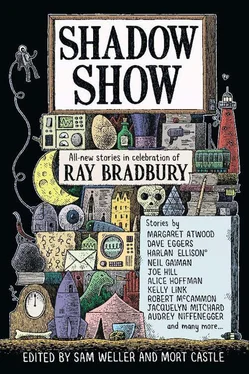The woman went about her chore of living, from day to day. She raised a few chickens and ate bitter eggs. She ate a lot of canned pork-’n’-beans and soup. She grew some dwarf tomatoes that were the color of the land and almost tasteless, but at least they were tomatoes, and she was proud of them. She had a shed full of bottled water, enough to last until Jesus came.
She was all right.
But sometimes at night, after she lit her candles with their tin reflectors and arranged them just so and chose from the special trunk an ancient yellowed book to read that reminded her of the world that was, her hardness cracked just a little bit. Just a little bit, like the shell of a bitter egg.
And there in that room with its candlelight and the smell of old paper and old ideas and the sound of the lonely wind searching outside the windows, the woman felt her heart become slowly crushed… slowly, slowly… until she had trouble breathing, and the tears bloomed behind her glasses and she had to put the book down for fear a wet drop might blur the words.
She was a hard woman, but she was not made of stone.
Oh, this world. Oh, this sad and brutal world. This careless world. This world of lost opportunities and crushed hearts.
The woman had been married once. She and her husband had had a son. But both of them, killed in a war. Before the satellites fell flaming from the sky. Before the buildings crashed down and the weather changed, summer in winter, and the oil burned in its millions of gallons upon the black-choked sea. Before so many of the fish and the birds and the animals God had commanded man to protect had died. So many.
So many.
The woman in her young days had wished for a large family. She and her husband had talked about that, long before the wedding bells. There was such strength in a large family. There was such happiness. But in the end they’d just had the one child, and he had died first in that foreign land. Then her husband, because he was a patriot.
This sad and broken world.
And when everything seemed to be over and everything was changed and nothing worked anymore, and even after no one knew who had won but everyone said they were the winners so they started fighting again to prove it until the world itself heaved and cracked… even after that… it was still not the end.
The woman sat at the center of her circle of candles. She took off her glasses and she rubbed her tired eyes.
No, still it was not the end. For though people wished for the end and roadside preachers shouted their prophesies and madmen and madwomen dragged themselves across the sunburned earth wearing upon their backs wooden crosses and upon their heads crowns of barbed wire… still it was not the end, and no suffering human being could say when the battered old world would stop its tormented turning and fall apart into the dust of ages.
The woman decided she would go to town tomorrow morning. She needed some more pork-’n’-beans and soup. She could take some eggs and tomatoes to trade. She needed to see people. So be it.
She put her book back into the special trunk with all the others, and then she blew out every candle but one and lay in bed for a long time staring at the ceiling until her blue eyes closed.
The next day was hot. Hot, hot… hotter than hot. Same as every day. The clouds were painted upon the sky. The sun was somewhere. The woman rode her green bicycle, the color of May. It was her little joke.
Douglasville wasn’t much of a town, but it was a place. It had some buildings and a few houses. It had some people living there. It wasn’t all empty. The woman pedaled her May-colored bike past the dump where all the car bodies had blistered and rusted and rotted. She didn’t even look at them anymore, didn’t even care how they used to work. She directed herself to the big store.
Now, this was an exciting place because the woman never knew what she might find there. She thought it had once been a grocery store—the size was about right, and so were the shelves—but now it was a little-of-anything store. The men who worked there wore guns, so nobody tried to steal anything a second time. But they were good men, and they knew her there, and even the tasteless tomatoes in her backpack were better than none at all because the texture and aroma counted for something. And the eggs… well, the yolks were yellow.
The woman enjoyed walking through the big store. Sometimes, when she was particularly lonely, she came here and just walked. Didn’t barter at all. She looked at old clothes and their labels. She looked at old shoes and old hats, and she tried to picture in her mind who’d worn them. Infrequently she found a book or two there. Or parts of books, because the sun and heat were not kind to paper. It had been a long time since there’d been any new books. Long before her son had died. In fact, she couldn’t remember exactly when. War wiped everything away, even happy memories.
But she did enjoy the big store. All the things in there. The items , the men called them. A toothbrush, a flowerpot, a welcome mat, a Scrabble game—you never knew what the people who passed by, like the last birds, had left behind for trade. Sometimes she found letters. But they were always very sad, so she had learned to leave them alone.
And there at the very back of the big store was the large pile of yesterday.
It never ceased to amaze her. All that, in one place. All that, and all useless.
“I just keep it,” said one of the men, standing beside her. “Call me sentimental.”
The woman nodded.
All those computers. All those—what were they called?—laptops and notebooks and cell phones of every small and smaller size and bright plastic color. Gizmos , she called them. The electronic book readers. The ones that read books for you, in any language and in any voice. The screens that showed the moving pictures called… what was that?… Oh, yes: 3-D. She figured the man kept them because they were, after all, pretty. And they had meant so much, once upon a time. Now they sat in dusty rows and heaps. The cell phones lay in laundry baskets. Was the man a collector? Possibly the batteries and innards had been of some use, many years ago. His father may have taken them as barter. Who could say where all these came from? They were just here, as they might be anywhere.
But without the wires both visible and invisible, they were all dead. Even the fanciest of the fancy, the brightest of the bright, the streamlined beauty and the pocket-sized powerhouse—all dead.
“Are you doing all right?” the man asked her, because though he was a much younger man, he did like her.
“I am,” she said. But then she decided to tell him the truth. “I’m having trouble sleeping just lately. You know. Things get in.”
“Sure. I know.” He shrugged. His shoulders were thin, but he had a large pistol on the holster at his hip. “Everybody has trouble now and again.”
“Yeah,” she said.
And he said, “Yeah,” as he stared at the linoleum tiles on the floor.
“I guess I need some canned stuff,” she said after a little while. “Anything new in?”
“No,” he told her. “Just the same.”
People had stopped eating so much. Everybody was thin. It was just something you got used to. A piece of bread could be a dinner; soak it in soup and you had a feast. But most people helped one another and shared when they could. There was no panic, and there was very little violence. The ones who had lived by that code were long dead. Now the remaining ones had taken on the thinness, the attitude and the patience of saints, as they waited for the end.
“Do you have anything new?” the woman asked, a question she’d not planned on asking. It had just come out, because she was thinking of the lonely house.
Читать дальше



![Lord Weller - Ритера или опасная любовь [СИ]](/books/421202/lord-weller-ritera-ili-opasnaya-lyubov-si-thumb.webp)








